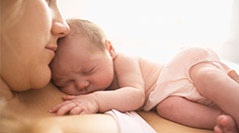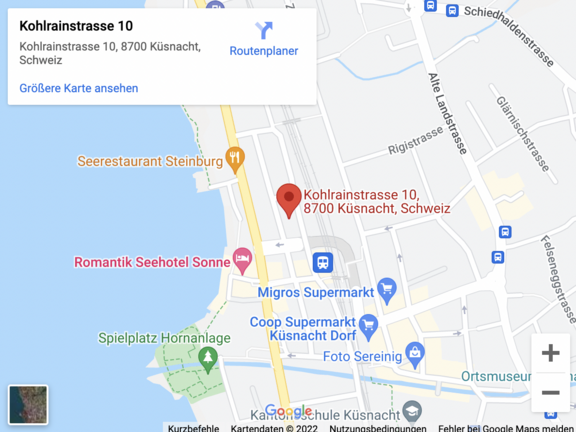Desire to have children in sterility
Every 8th - 10th couple in Switzerland remains unintentionally childless. This diagnosis, known as infertility, has increased constantly in recent decades. The desire to have children is a basic need for most couples, and involuntary childlessness is difficult for many couples to cope with and often leads to depressive moods and even relationship problems.
It is important to remember that involuntary childlessness is a couple's problem and should therefore be addressed by the couple together. Blaming one partner or the other leads nowhere, is hurtful and usually delays the process.
Definition of infertility
If you wish to have children after one year of unprotected sexual intercourse, this is called sterility. At the latest then, it is advisable to have a fertility or infertility check-up. If you are over 35 years of age or if you have severe cycle irregularities, this clarification may be justified after 6 months.

Causes of the unfulfilled desire to have children
The causes of infertility are very different. In general, however, it can be said that one third of the causes are in the man, one third in the woman, and one third combined in the man and the woman. The causes of the overall increase in infertility cases are mainly due to the increase in the age of the couple at the time of childbearing. Since treatments can vary greatly depending on the cause of infertility, accurate assessment of both partners is a prerequisite for successful treatment.
In addition to the age of the couple, endometriosis is one of the most common causes of infertility in women (see under the chapter on endometriosis). In the man, it is still unclear what has caused the sperm quality to continuously deteriorate over the past decades.
Causes in both partners for reduced receptivity (fertility) include smoking and obesity in particular.
Previously experienced or still chronically active inflammations can also lead to an unfulfilled desire to have children.
Rare causes can also be tumors in man and / or woman.
A thorough search for the cause of infertility in men and women is highly recommended, not only because of the desire to have children, but also because of possible diseases underlying infertility.
Clarification of the unfulfilled desire to have children
As mentioned above, it makes sense to perform an infertility evaluation after 6-12 months of involuntary childlessness. For this purpose, a so-called cycle monitoring is carried out in the woman, during which the following examinations are performed:
- 1-3rd day of the cycle (1st day of bleeding = 1st day of the cycle): Extended hormone analysis
- 9th - 11th day of the cycle: flushing of the fallopian tubes. Nowadays, this examination is carried out in the practice in a gentle manner and is usually associated with only minor discomfort. The exact procedure will of course be explained to you in advance.
- 14th day of the cycle: co-cycle gynecological examination with assessment of cervical mucus, mucosal thickness and ovaries (including vaginal ultrasound)
- 20th-22nd day of the cycle: determination of progesterone, to assess whether ovulation has occurred or not, and the quality of the corpus luteum.
In the male, a spermiogram is performed first. For this purpose he is registered at Labor Medica (please link). The ejaculate is then delivered and evaluated directly at Labor Medica in Zurich. If the sperm count is suspicious or abnormal, the man will be referred to a specialist for further clarification.
Increasing the chances of having children
On this topic, outdated and unsubstantiated information is often spread, which unnecessarily burden the love life of an infertile couple (such as lying down for 30 minutes after ejaculation with the pelvis elevated ...).
The following points should help you to increase your chances of getting pregnant:
- The most fertile time is in the six days before ovulation. During this time, a couple should take the time to have intercourse approximately every other day.
- The maximum fertility is reached on day-2 (two days before ovulation), while the day of ovulation (day 0) is no longer very promising.
As a result, the urine test strips used to detect ovulation (LH hormone) only indicate when the best time has already passed, on day-1. Apart from that, these strips do not indicate actual ovulation, but only the hormonal surge of LH, which should normally trigger ovulation. However, with increasing age it happens more and more frequently that ovulation does not occur despite the increase of LH. I therefore do not recommend using these 8expensive) test strips for timing lovemaking. Since ovulation can be once on day 12 and the next time on day 16 even with a regular cycle of 28 days, there is no method (except measuring the follicle with ultrasound) to determine the most fertile time in advance. Especially working and stressed couples are much better off with the recommendation to have intercourse twice a week regardless of the cycle phase. This way, you always "catch" the fertile window and avoid the tendency to have sex only when it is "worth it".
Treatments for infertility
The following treatments are performed in the practice:
- Stimulation of the ovaries with injections or tablets
- Monitoring the follicles until ovulation with ultrasound
- Triggering ovulation with Ovitrell
- Supporting the luteal phase with progesterone
- Semen preparation and injection into the uterus (intrauterine insemination)
- Artificial insemination in cooperation with IVF centers
What we can do for you
Treatment for infertility always begins with a detailed discussion, if possible with both partners. A thorough medical history is taken and the possibilities of clarification and treatment are discussed.
After the clarification of both partners, the possible treatments are discussed in a next joint consultation and a "roadmap" for the desire to have a child is drawn up.
With this concept we are able to fulfill the wish for a child for several couples every year, which not only pleases the couple, but also our whole team.
Contact
GYNÉ LANG
Kohlrainstrasse 10
8700 Küsnacht (Zurich)
Phone +41 44 912 25 25
praxis@gynelang.ch
Opening hours
| Monday | 08.00 - 12.00 | 13.30 - 16.30 |
| Tuesday | 08.00 - 12.00 | 13.30 - 16.30 |
| Wednesday | 08.00 - 15.00 |
| Thursday | 08.00 - 12.00 | 13.30 - 16.30 |
| Friday | 08.00 - 15.00 |
![[Translate to English:] Frauenarzt Zürich [Translate to English:] Frauenarzt Zürich](/fileadmin/sites/gynelang/media/gynelang_logo.png)


